Category: News
Meet Wengay’s Kitchen owner Krizia Cherece
We’re excited to introduce you to the businesses that offer cuisines from around the world at Spice Bridge, our new food hall! Today we’d like for you to meet the owner of Wengay’s Kitchen.
From a young age, Krizia Cherece could be found in the kitchen, helping her mother, Wengay, make traditional Filipino food. It’s no surprise that her mother is the inspiration for her business’s name, Wengay’s Kitchen.
“The kitchen is the place my mother taught me everything I know, and it’s the place where our friends and family celebrate what we love best—food!” shares Krizia.
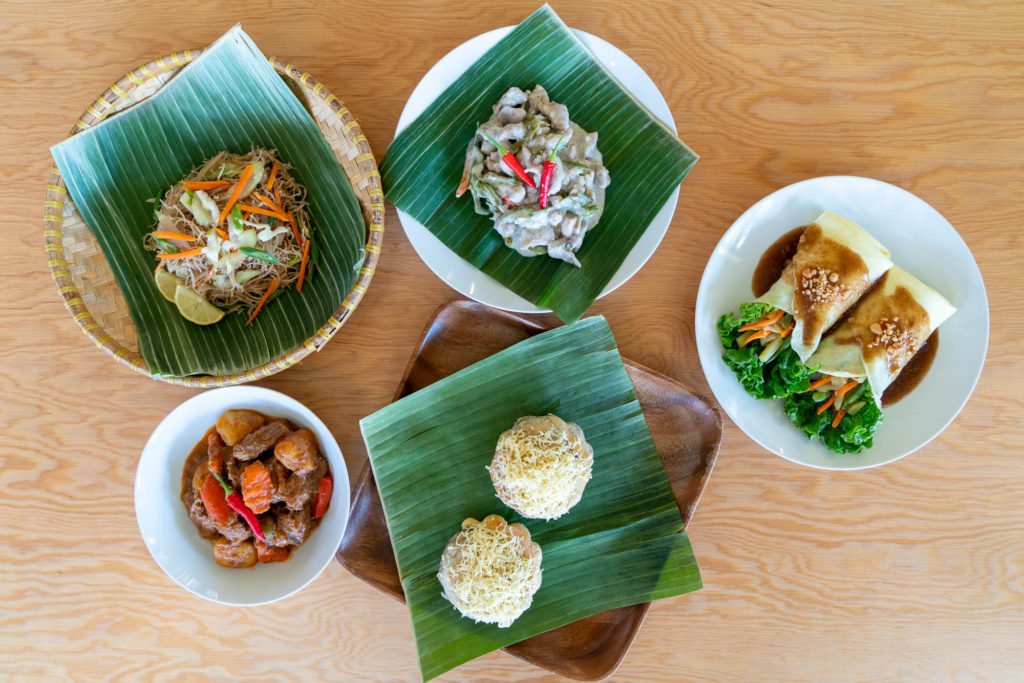
At Wengay’s Kitchen, Krizia showcases traditional Filipino cuisine. She strives for authenticity, incorporating different regions of the Philippines and using long-established cooking techniques and traditional ingredients. The menu features comfort food that will remind Filipinos of home while also delighting families and foodies.
Try the lumpiang sariwa, a fresh version of traditional lumpia, loaded with veggies and covered in a sweet and savory sauce, or the ube ensaymada, a dense bun filled with ube jam.

Read our Q&A with Krizia to learn about Filipino cuisine, her motivation for starting Wengay’s Kitchen, and her dream for her business.
What kind of cuisine do you serve at Wengay’s Kitchen?
Wengay’s Kitchen specializes in traditional and authentic Filipino cuisine, including traditional baked goods and desserts.
What makes Filipino cuisine special?
Because of Philippine’s dense history and vast archipelago, the cuisine is quite unique. Filipino food showcases a colorful combination of sweet, tangy, and salty flavors. Rice, meat, and an array of vegetables are the main staples, mixed with a variety of aromatic herbs and spices. From indigenous recipes, to diverse regional ingredients and methods, and the influences brought over by other nations, each dish has its own story. It’s like a culture trip in your mouth!
What sets Wengay’s Kitchen apart from other eateries?
There are limited traditional Filipino restaurants in our area. My goal is to provide a sense of home and comfort for anyone trying our food, but especially for our local Filipinos. Currently, Filipino food has been trending and people are starting to become interested in our cuisine. However, this trend and curiosity has been introduced by Filipino fusion food. Although this interpretation and perspective on our cuisine is great and creative, it lacks the interpretation of history and culture that I want to share. My goal is to share authenticity through my food. I want to share a traditional menu without the frills of fusion. I want to incorporate different regions of the Philippines through my menu by keeping the long-established cooking practices and traditional ingredients as a way to celebrate and honor our culture.
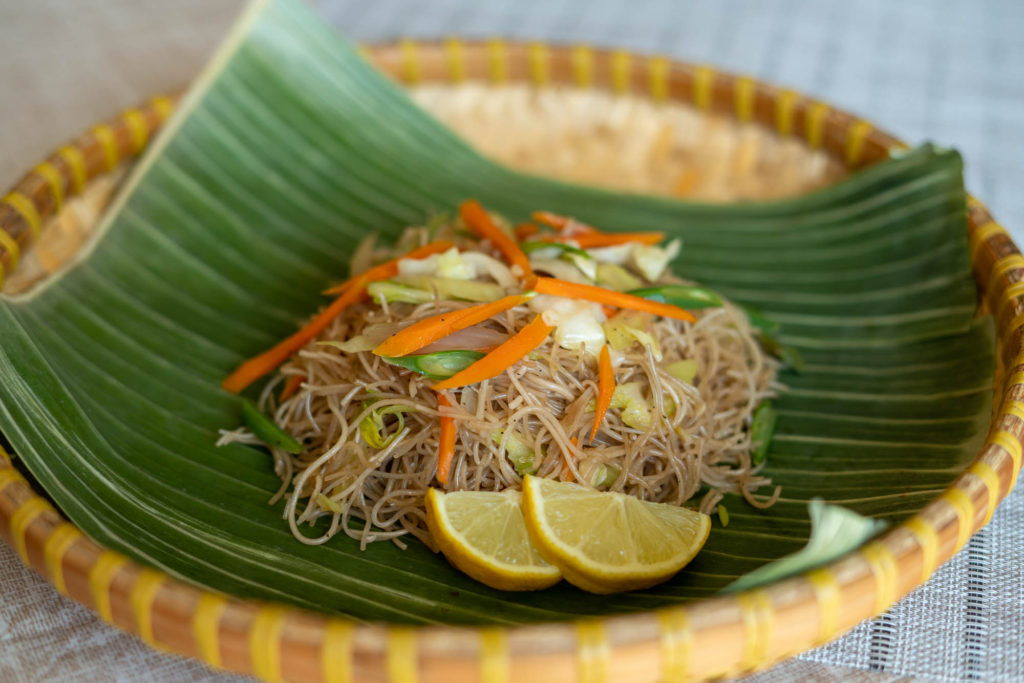
Why did you want to start this business?
Ever since I was a child, I had always been in the kitchen helping my mom with chopping or stirring. I had always wanted to help, even if I just ended up being a nuisance. The preparation and creating of dishes had always been so fun to me.
When I was in college, I just randomly decided to fry donuts from scratch. I started to give some to my friends and soon some of them started ordering by the dozens! From creating something from scratch, to watching my friends love what I also loved, it was something I didn't expect to completely enjoy. From then on, I started to learn how to make traditional Filipino food from my mom. I completely immersed myself into learning new dishes or baked goods. It was then that I wanted to keep sharing what I enjoyed doing.
My main motivation in starting this business is to share what I love and share what I enjoy doing. After going to school for a completely different career, I realized starting this business will help me reach my full potential and my most genuine self. Through this self-expression, I will be able to connect and create relationships with people through food and service. I want to connect with my community especially. The process of starting a business has helped me learn accountability, leadership, responsibility, and empathy towards a more fulfilling work.
What challenges have you encountered trying to establish your business?
For me, the hardest part was the initial stage of starting a business. I really didn’t know where to begin. After forming my business idea and doing lots of research, everything became so overwhelming, that it discouraged me from pushing forward. Fortunately, I stumbled upon FIN! From learning about the incubator program, to formulating menus, logos, and so much more, I have been less overwhelmed with the whole process. With the guidance and encouragement from all the admirable women I have been blessed to work with, I am so glad I don’t have to go through this all alone.
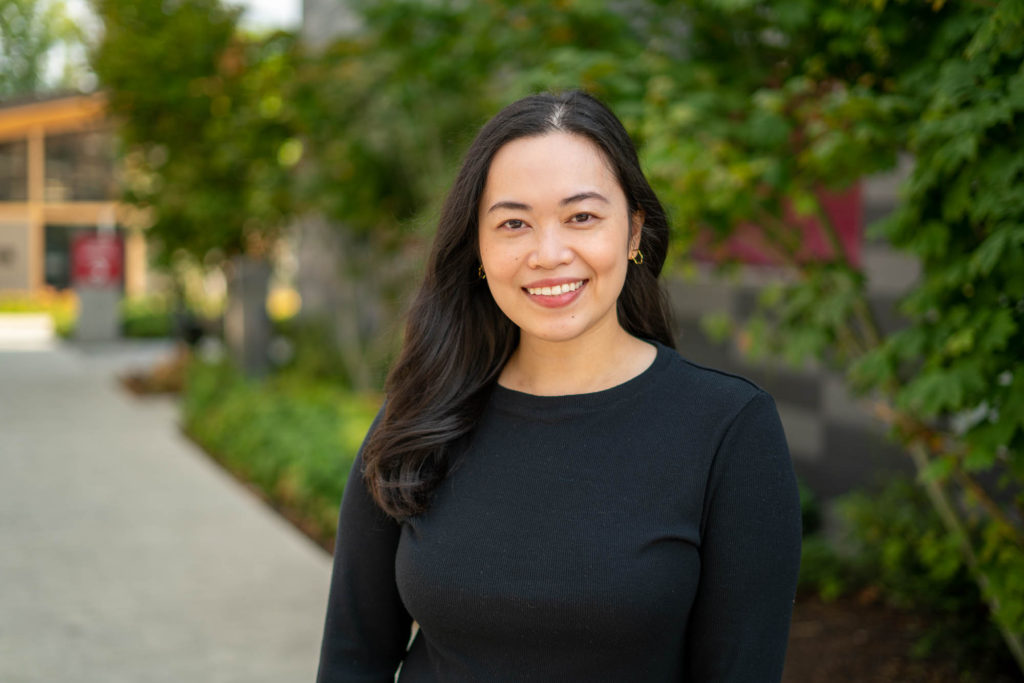
What is your dream for your business?
My ultimate dream is to be able to have a brick and mortar restaurant that I can call my own home. But for now, my goal for this business is to be able to share what I enjoy making. My dream is to share my culture and my authenticity through the dishes I create.
Visit Spice Bridge
Come by Spice Bridge to order food from Wengay’s Kitchen and other rotating vendors. We have takeout and outdoor dining available, and we’re also working on delivery options—stay tuned!
Wengay’s Kitchen is open at Spice Bridge on Tuesdays and Wednesdays from 11 a.m. to 8 p.m., and on Sundays from 10 a.m. to 5 p.m. Wengay’s Kitchen is also available to cater events.
Contact Wengay’s Kitchen
- Email: krizia@wengayskitchen.com
- Instagram: @wengayskitchen
- Facebook: @wengayskitchen

Thanks to FIN volunteer Lily Rybarczyk for assistance writing this Q&A!
Press Release: Immigrant and Refugee Chefs Cook Up a World of Cuisines At New Spice Bridge Food Hall
Contact: Kara Martin, kara@foodinnovationnetwork.org, 206-850-2877
TUKWILA, WA—What does South King County’s diversity taste like? Immigrant and refugee chefs are now answering that question at Spice Bridge, the newly opened food hall and commercial kitchen in Tukwila. Operated by the nonprofit organization Global to Local, Spice Bridge is the cornerstone of their Food Innovation Network (FIN) program, which helps aspiring entrepreneurs launch and build food businesses.
“Spice Bridge allows for food entrepreneurs to make an income and show their potential, and also gives our community the ability to experience and appreciate the diversity of cultures through food,” said longtime Tukwila resident Ehler Win, who co-chairs the FIN steering committee.
Eight food vendors rotate through four stalls in the sunlit food hall, offering a new dining experience every day. With indoor dining currently restricted, the initial group of eight women-owned businesses are offering takeaway meals and making use of outdoor seating in the new Tukwila Village development. Entrees ranging from Congolese to Cambodian are priced from $8 to $16, served every day but Monday.
“We in the City of Tukwila are super excited to welcome Spice Bridge to the community,” said Tukwila Mayor Allan Ekberg. “Their mission to help women of color and immigrants start and grow thriving businesses is a perfect fit for our city because we are so wonderfully diverse. I feel the Spice Bridge food hall will become the favorite spot for people to connect through food. It will also add to the flavor of Tukwila Village as a central gathering place for all our community. I can’t wait to enjoy the varied cuisine one will find at the Spice Bridge food hall.”
Food businesses have traditionally been a way for many striving immigrants and low-income families to gain a foothold in the economy. However, skyrocketing real estate and rental rates make it difficult for these entrepreneurs to access commercial kitchen and restaurant spaces in South King County.
Spice Bridge provides the space and support to help these entrepreneurs launch and scale to successful businesses. The new 2,800-square-foot facility includes a commercial kitchen with four cook stations, four food retail stalls, and a community dining area. The space can accommodate up to 20 food businesses that either rent retail stalls in the public dining area, or use the kitchen for off-site sales, such as catering, farmers markets and packaged products. Subsidized kitchen and retail space is just one element of FIN’s program—they also assist entrepreneurs with all aspects of starting a business, from licensing and permitting to menu development and marketing.
In addition to helping to create economic security for business owners and their families, Spice Bridge helps build food security. The space supports FIN’s Tukwila Village Farmers Market, which makes fresh, local produce affordable and accessible for community members. Spice Bridge is also utilized for FIN’s community meals initiative, which has provided more than 8,000 no-cost meals for seniors and families in need.
Spice Bridge is funded by individual and corporate contributors, a Washington State grant, the Port of Seattle, and King County and Seattle Foundation’s Communities of Opportunity initiative.
Location and schedule
Spice Bridge is located in Tukwila Village at 14200 Tukwila International Blvd. Suite 141, Tukwila, WA 98168. Free parking is available between Spice Bridge and the Tukwila Library.
Takeout and outdoor dining is available from 11 a.m. to 8 p.m. Tuesday through Saturday, and from 10 a.m. to 5 p.m. on Sunday.
Food vendors
- Taste of Congo, the only Congolese food business in Washington, offers grilled meats and hearty stews. Open Tuesday, Saturday, and Sunday.
- Afella Jollof Catering cooks up authentic Gambian/Senegalese cuisine. Open Tuesday, Wednesday, and Thursday.
- Seatango crafts artisan empanadas and sweet pastries from Argentina. Open Wednesday, Thursday, and Friday.
- Moyo Kitchen serves Somali-Kenyan-Tanzanian fusion food inspired by Zanzibar, the world’s spice capital. Open Friday, Saturday, and Sunday.
- Wengay’s Kitchen offers authentic Filipino food prepared with traditional ingredients. Open Tuesday, Wednesday, and Sunday.
- Theary Cambodian Foods serves healthy, authentic Cambodian/Khmer cuisine. Open Thursday, Friday, and Saturday.
- WUHA offers fast Ethiopian food options, serving both authentic foods and American foods cooked with Ethiopian spices as a gateway to more traditional dishes. Open Tuesday, Wednesday, and Sunday.
- Jazze’s cooks up Afghan food made from organic, locally grown ingredients. Open Thursday, Friday, and Saturday.
About Global to Local and Food Innovation Network
A program of Global to Local, the Food Innovation Network enhances the local food system, increases access to healthy foods, and supports local food businesses in the diverse communities of SeaTac/Tukwila and South King County. Global to Local is a SeaTac-based nonprofit organization whose programs embody a racial and ethnic approach to ensure all South King County communities have the opportunity to thrive.
Reintroducing Taste of Congo owner Caroline Musitu
We’re excited to introduce you to the food vendors that will offer cuisines from around the world at Spice Bridge, our new food hall opening on Sept. 8.
You may already be familiar with the vendor we’re featuring today! Taste of Congo owner Caroline Musitu joined our Food Business Incubator in 2018, and has grown her business at pop-ups, catering events, and FIN’s Taste Around the Globe booth at farmers markets. Caroline introduced herself in this video last year.
Originally from the Congolese city of Kinshasa, Caroline grew up helping her mother cater weddings, parties, and church meetups. Several years ago, Caroline fled armed conflict in the Democratic Republic of Congo and started a new life in South King County. Realizing there were no Congolese food businesses in our region, she launched Taste of Congo to share her home country’s unique flavors with her new community.
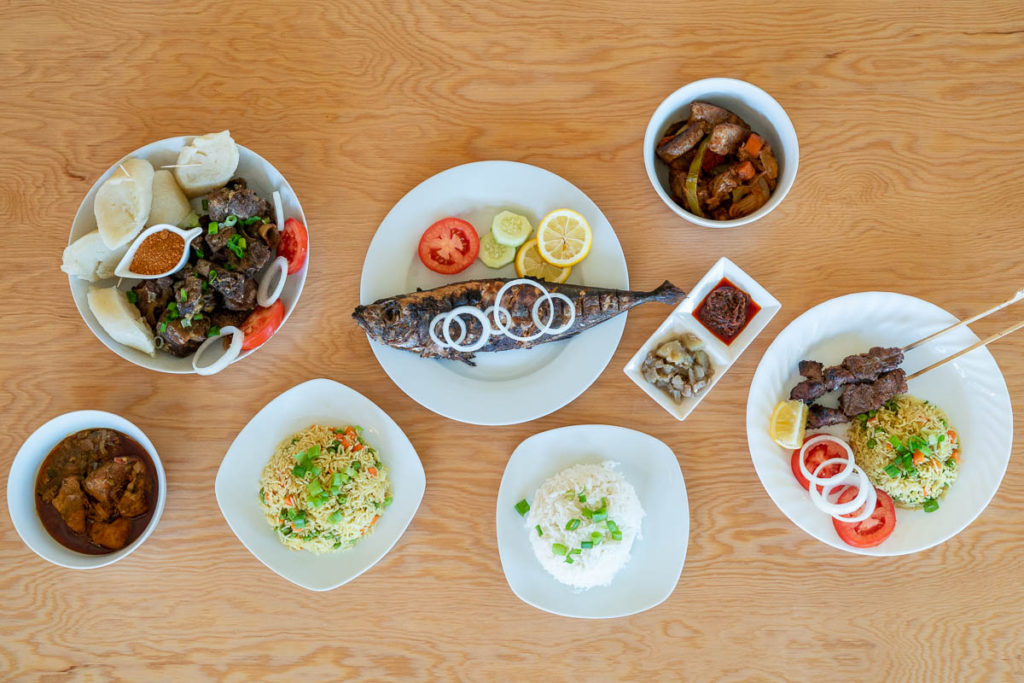
We recently spoke with Caroline about her Spice Bridge menu, what she’s learned as a business owner, and her dreams for Taste of Congo.
Can you please describe a few of the dishes that you'll offer at Spice Bridge?
Ntaba, grilled goat, is popular to eat after work in Congo. I serve it on brown paper like they do in Congo. We eat it with kwanga [boiled fermented cassava], and we put toothpicks in the kwanga to make it easier to share.
We can also talk about beignet—they’re popular, too! Mikate is the Congolese word for them. They’re deep-fried dough. In Congo in the morning there are mikate vendors on the corners of the streets. They're out there early, at 6 or 7, so that when people get up for work they can come by to get breakfast. But you can eat beignet anytime—in the morning, afternoon, and evening. We like to eat them with peanut butter—it's so good!
And of course there’s chicken stew, poulet a la moamba. It's a popular dinner cooked with onion, garlic, and tomato.

You joined FIN's Food Business Incubator in 2018. What have been some of the highlights of the last two years?
I didn't know how to start the business, but FIN helped me and made it easy for me to start. I've done farmers markets, pop-ups, and some catering jobs. The best experience has been setting up at farmers markets. I've met a lot of customers, including some that had lived in my country, and they got so excited to see Congolese food.
What have you learned, and how has your business changed?
I learned how to manage a website and do things online that I didn't know before. When COVID happened, FIN helped me set up an ordering website so people could order my food for pickup. I keep learning, and I know I will learn more as my business grows at Spice Bridge.
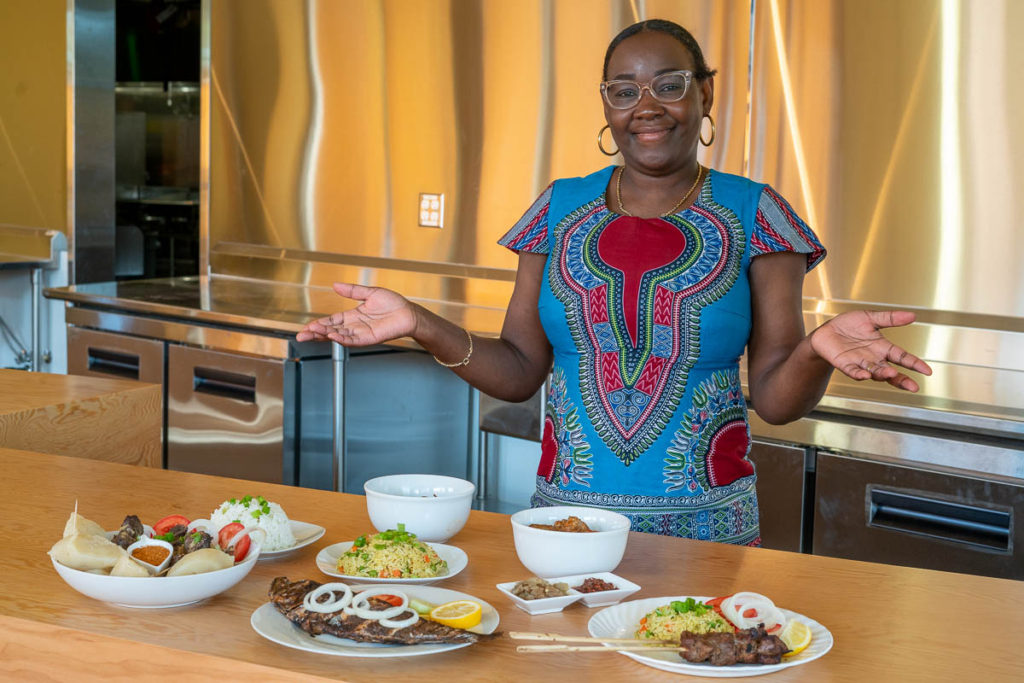
When you visited the Spice Bridge space for the first time last month, it was obvious that you were very excited. What will this new facility mean for you and your business?
It's a nice building, very beautiful! It means so much to my business. More customers will know me, my business will grow, I’ll have more income, and I will be more independent.
What is your dream for Taste of Congo?
My dream is to see Taste of Congo become its own restaurant, and also offer packaged foods, like my chili sauce. I want to ship my foods all over the United States. I want for everybody to try them!
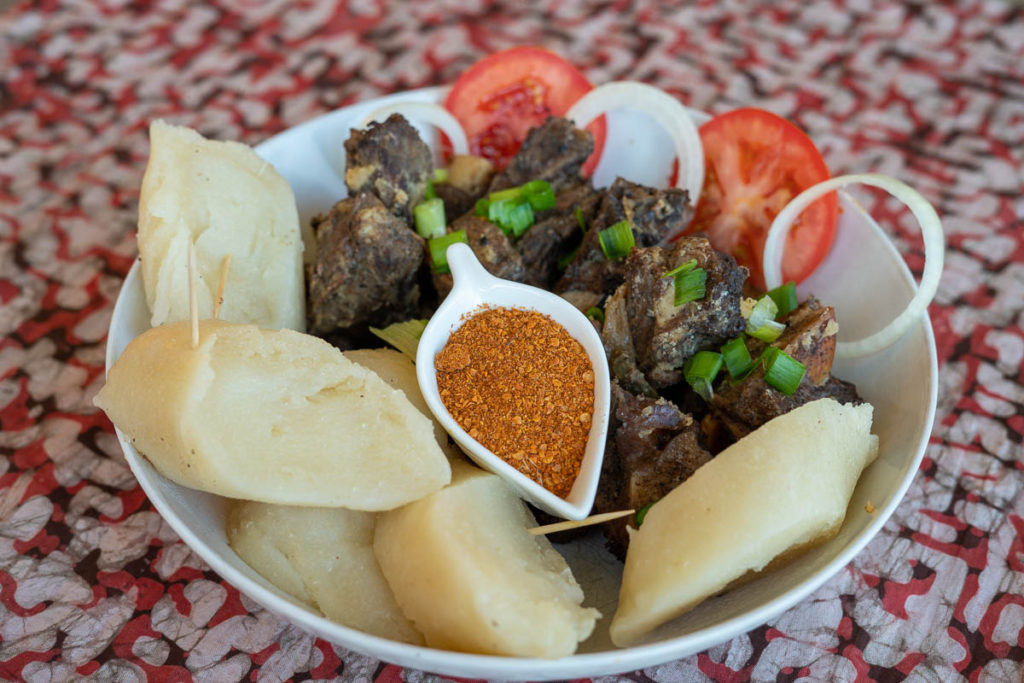
Visit Spice Bridge
Starting on Sept. 8, you’re invited to come by Spice Bridge to order food from Taste of Congo and other vendors. We’ll have takeout and outdoor dining available, and we’re also working on delivery options—stay tuned!
Taste of Congo will be open at Spice Bridge on Tuesdays and Saturdays from 11 a.m. to 8 p.m., and on Sundays from 10 a.m. to 5 p.m. Taste of Congo is also available to cater events.
Contact Taste of Congo
Website: tasteofcongo.square.site
Phone: (206) 778-5615
Email: tasteofcongoseattle@gmail.com
Facebook: @tasteofcongo
Instagram: @tasteofcongoseattle
Meet Moyo Kitchen owners Mwana Moyo and Batulo Nuh
We’re excited to introduce you to the businesses that will sell cuisines from around the world at Spice Bridge, our new food hall opening in September! Today we’d like for you to meet the owners of Moyo Kitchen.
Mwana Moyo and Batulo Nuh each make up one half of Moyo Kitchen. Mwana originally hails from Tanzania. Batulo, a Somali, was raised in Kenya. Here in King County, they bonded over their shared love of food, cooking, and celebrations. The two neighbors have used both their similarities and differences to create a unique combination of authentic East African food at Moyo Kitchen.
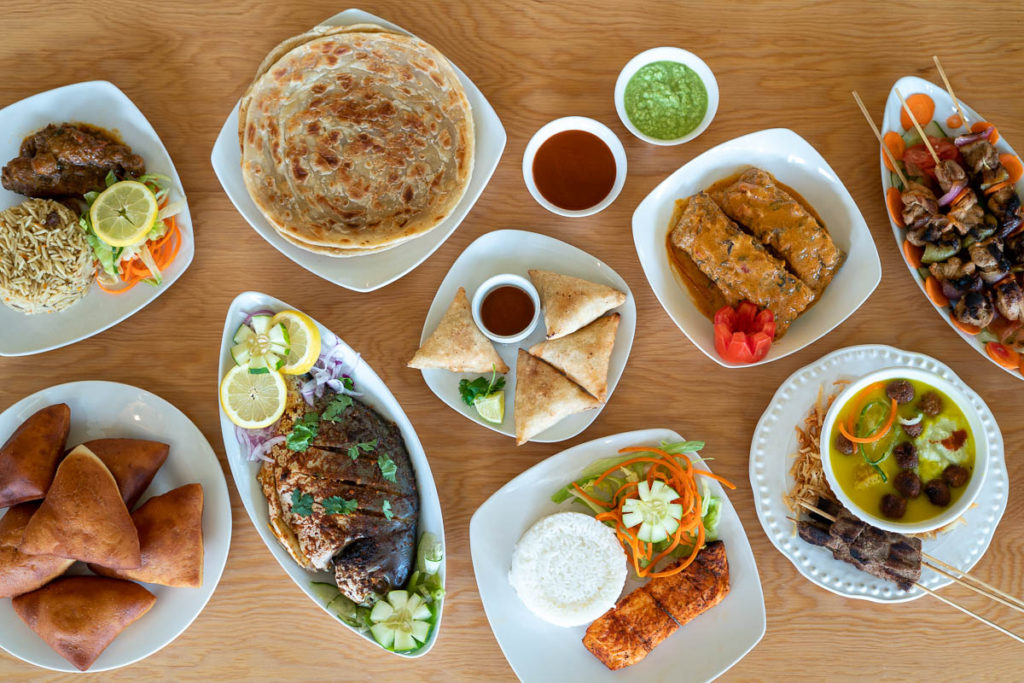
Dedicated to their craft of cooking and to their community, Mwana and Batulo also work as a caregiver and a social services case manager, respectively. Although Mwana has previously provided small-scale catering, FIN’s Food Business Incubator is helping to scale Moyo Kitchen, which will continue to offer catering while finding a new home at Spice Bridge.
In addition to being Mwana’s last name, Moyo is also Swahili for “heart,” which the partners definitely bring to the kitchen. Their hope for Moyo Kitchen is to continue growing, sharing love and culture with people through good food!
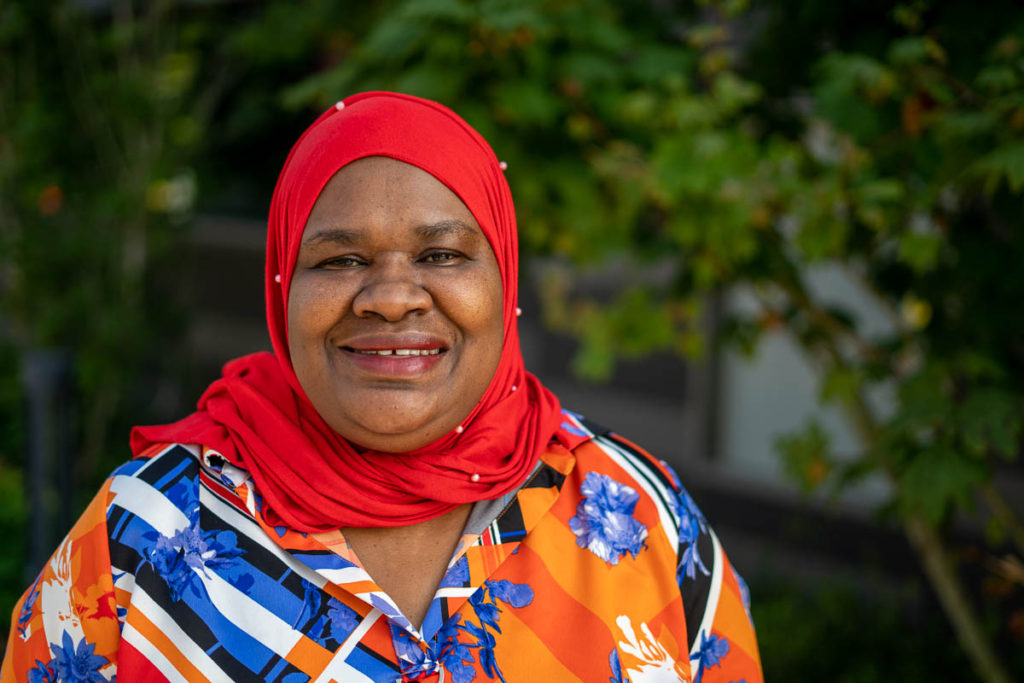
We spoke with Mwana and Batulo about how they learned to cook, the Zanzibari spices they use, and what it’s like to start a food business.
What type of cuisine do you offer?
Batulo: Mwana is from Tanzania. I’m Somali but raised in Kenya, so we have these three cultures combined that makes us unique.
Mwana: We offer catering and will also have a kiosk at Spice Bridge. Through catering we’ll be able to offer more options, depending on what customers want. Everything will be halal. We’ll have a lot of options for everyone! I know for sure people who try it will want to come again.
Can you talk about what makes Moyo Kitchen’s food special?
Mwana: The spices are from my country, Zanzibar, which we import: cumin, cloves, black pepper, garam masala, tamarind masala. All of those spices we are going to use at the kiosk. The way I cook, the way I mix together the food, it’s the way I learned to cook from my grandma.
Batulo, where did you first learn to cook?
Batulo: I learned from my mom, which she learned from her mom and her older sisters.
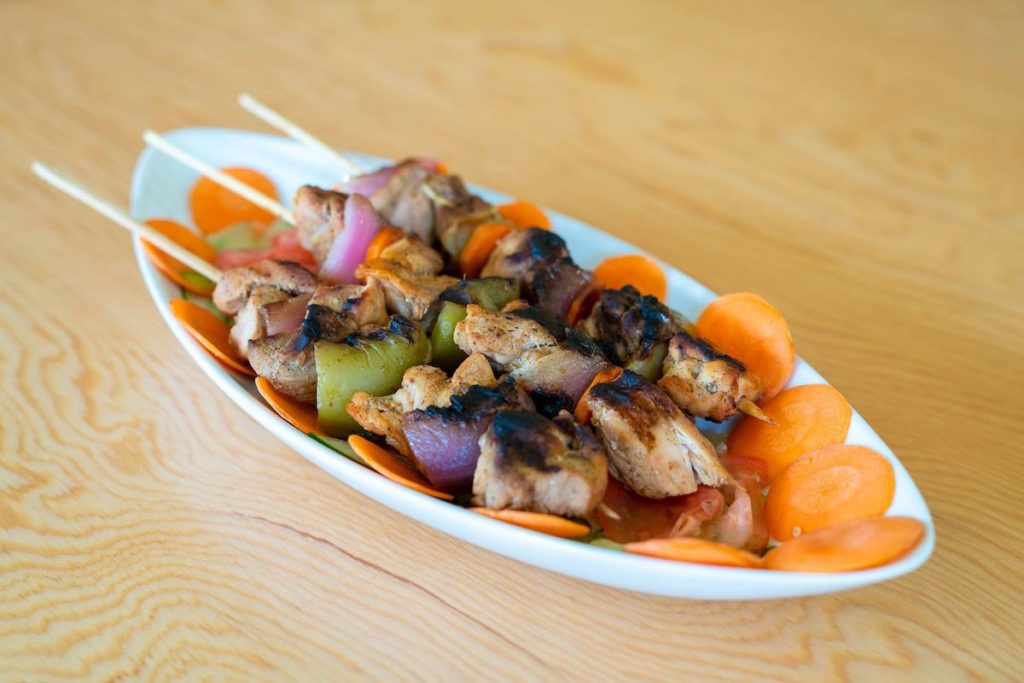
Can you talk about your personal story?
Mwana: I’m from Zanzibar, Tanzania. I came to America in 1998 with my two children. I have lived in Washington since then, never moved. When I came here my goal was to open my own restaurant, but it was hard. At that time I didn’t have anything. I went to school and asked people how to do this. In 2019, my auntie introduced me to Njambi [FIN’s Cultural Outreach Specialist]. She told her, “She knows how to cook, maybe we can put her in our program.” So this year I made it into the program and started.
Batulo: I started helping my mom cook when I was 10 or 12. My mom cooks a lot, all the time, at least three times a day. Me, being the oldest girl, mostly helped prepare the food. I would see her mixing all this food together without measuring. It is hard to follow what she does because there’s no measuring, it's all eyeballing. That is how I got introduced to cooking. And whenever we had a multicultural day at school, I used to love sharing the food.
I’m Somali but raised in Kenya; I have the Kenyan culture but also the Somalian culture. I speak both languages, I cook both foods in the house all the time. And Tanzanians and Kenyans, they have the same language as well, and our food is also similar—with a little twist.

How did those conversations start about having a business together?
Mwana: I’ve been thinking about this for a long long time, and I’ve been cooking for a long time, 20 years.
Batulo: We would cook for parties and celebrations, and we started sharing our food. Then we talked about how similar it was. We talked about being in business together for some time. The financials and finding a place was hard. It is very expensive to find a place and then to pay each month is a lot. I just recently got married, so I am still starting my life. Mwana is a single mom. We both work. It is hard to stop working and focus on our dream, because at the same time we have to pay the bills. Last year Mwana informed me about the Food Innovation Network, and we said we were going to do it. When we got this opportunity it was perfect because FIN is helping us and guiding us with each step we have to take.
Visit Spice Bridge
Starting in September, you’re invited to come by Spice Bridge to order food from Moyo Kitchen and other rotating businesses. We'll have takeout and outdoor dining available, and we’re also working on delivery options—stay tuned!
Moyo Kitchen will be open at Spice Bridge on Fridays and Saturdays from 11 a.m. to 8 p.m., and on Sundays from 10 a.m. to 5 p.m. Moyo Kitchen is also available to cater events.
Contact Moyo Kitchen
- Website: moyokitchen.square.site
- Phone: (425) 502-0825
- Email: moyokitchen20@gmail.com
- Instagram: @moyokitchen20

Thanks to FIN volunteer Lily Rybarczyk for assistance writing this Q&A!
Meet Seatango owner Monica Di Bartolomeo
We’re thrilled to introduce you to the businesses that will sell cuisines from around the globe at Spice Bridge, our new food hall opening in September! Today we’re featuring Seatango.
Monica Di Bartolomeo and her husband, Ariel Firpo, offer authentic Argentinian savory dishes and sweets inspired by their upbringing in Buenos Aires, where they woke each morning to pleasant smells wafting in from local bakeries. Through Seatango’s artisanal baked goods, Monica and Ariel bring a similarly delightful sensory experience to Spice Bridge—you’ll love the aromas and flavors of their pastries, empanadas, and more!

We spoke with Monica about the culinary heritage that informs her signature offerings, the challenges of starting a small business, and her dreams for Seatango.
Tell us about your business.
Seatango offers authentic Argentinian cuisine. We’re the only local business that serves facturas (Argentinian pastries) made from scratch! We have a catering service that specializes in beautifully presented picadas (savory appetizers), mesa dulce (a variety of desserts), empanadas, and asado (grilled meats). We’re excited to offer facturas, empanadas, mate tea, coffee drinks, and more at our Spice Bridge kiosk starting in September!
What inspired you to start this business?
Every morning in Buenos Aires, I would wake up to the wonderful smell of facturas coming from the local bakery. We had them for breakfast most mornings, and anytime we visited friends for mate [tea] time. My husband, Ariel, and I love facturas, but we couldn’t find them in Washington state. We decided we wanted to bring this tradition of fresh, delicious pastries to our area. In addition to sweets, we offer authentic Argentinian appetizers and full meals.

What do you like best about your work?
I love the satisfaction of people enjoying my food, happy and smiling. It makes me feel emotional just thinking about it! And I love it when customers ask to meet the chef.
What is something people might be surprised to learn about you or your business?
My husband and I are both from Argentina, and our ancestors came from Italy, Spain, and Arabic countries. This heritage was reflected in the foods we ate growing up, and continues to influence our menu now. We use many recipes and techniques we learned from our families. My father was an Italian-Argentian chef, and I learned a lot helping him in the kitchen as a child. Ariel’s mother and grandmother were both pastry chefs, and they taught both Ariel and me how to make old-fashioned facturas. They all made food from scratch with love, and we’re happy to continue that legacy.
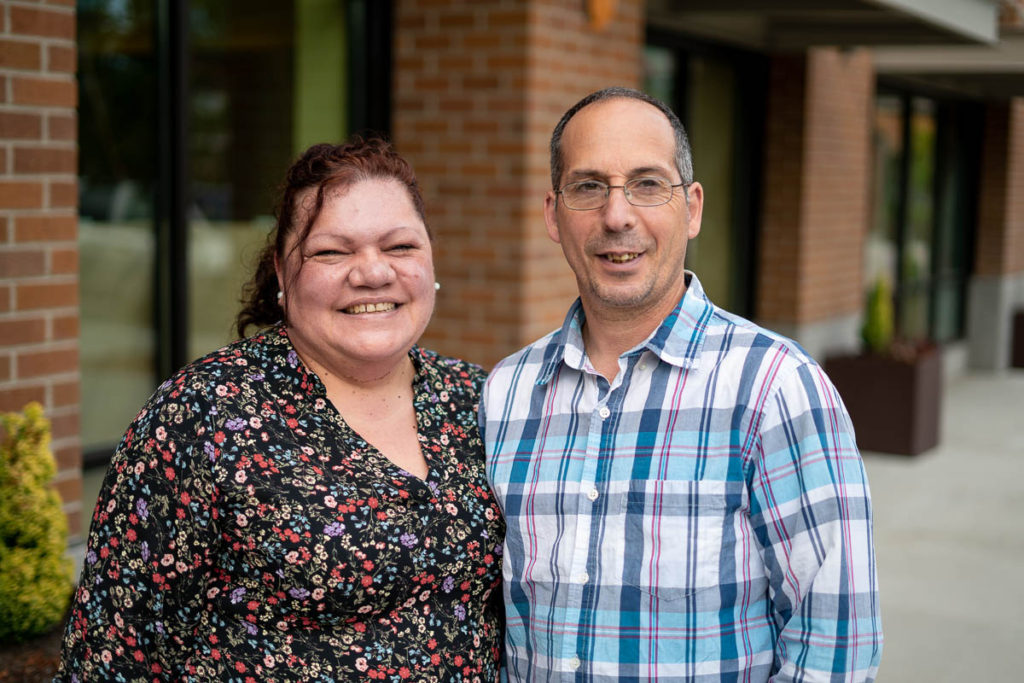
What’s been the biggest challenge in launching or running your business? What types of services or programs have been helpful?
We’ve been persistent in pursuing our dream of owning this business, but it’s been challenging to get the financial capital to invest in things like permits, equipment, and marketing expenses. Joining Ventures has been a great help. Using their commercial kitchen and starting as a catering company has allowed us to have lower starting costs compared to opening our own space right away.
I’ve had to learn to let others support me. Sometimes we think we’re Superman or Superwoman, but it’s a heavy burden to do it all on your own. It’s better to work as a team. That’s one reason I’m excited to be part of FIN’s Incubator: I’m working alongside other business owners, and we can help each other.
What is your dream for Seatango?
We want to have our own brick-and-mortar shop one day. Opening our kiosk at Spice Bridge is a very big step toward that dream!
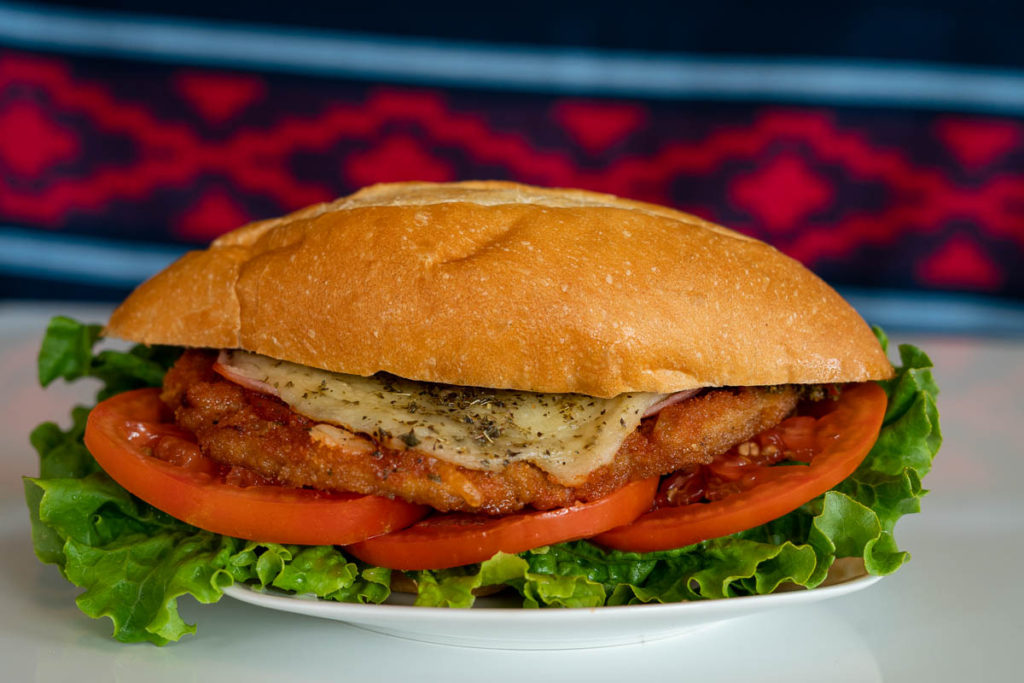
Visit Spice Bridge
Starting in September, you’re invited to stop by Spice Bridge to order Seatango and other wonderful cuisines for takeout or outdoor dining. (We’re also working on delivery options—stay tuned.) Seatango will be open on Wednesdays, Thursdays, and Fridays from 11 a.m. to 8 p.m. Seatango is also available to cater events.
Contact Seatango
- Website: seatangofoods.com
- Email: monica@seatangofoods.com
- Instagram: @seatangofoods
- Facebook: @SeaTangoArg

Thanks to FIN volunteer Levi Robischon for assistance writing this Q&A!
Meet Afella Jollof Catering Owners Adama Jammeh and Oumie Sallah
We’re excited to introduce you to the businesses that will sell cuisines from around the world at Spice Bridge, our new food hall opening in September! First up: Afella Jollof Catering.
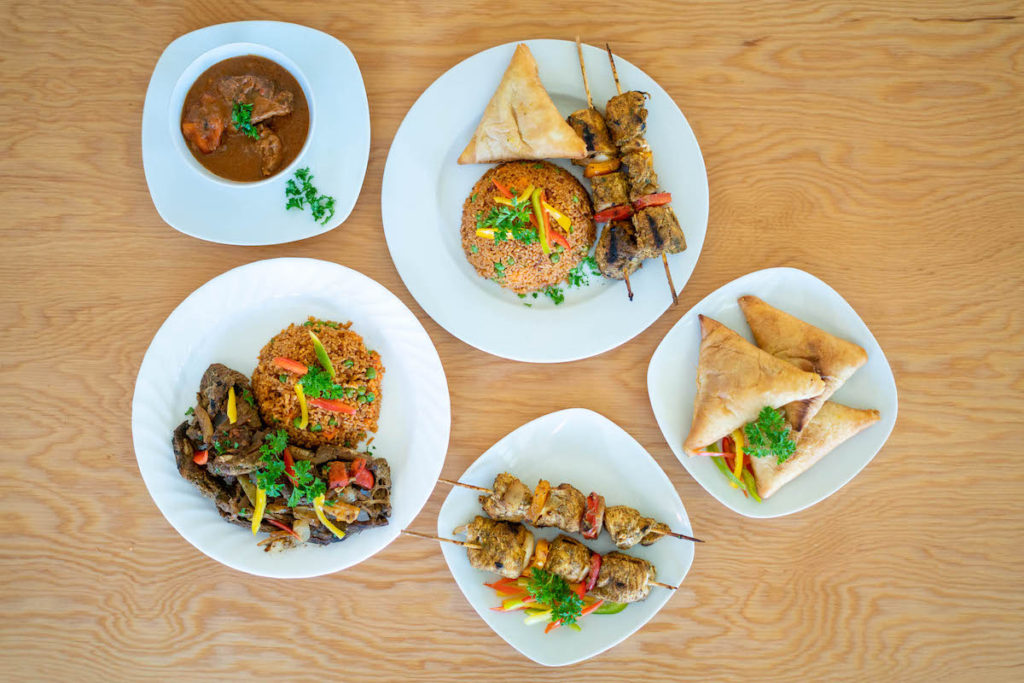
Raised in Gambia, Adama Jammeh came to King County three years ago by way of St. Louis and Atlanta. She was long considered an exceptional cook by her community, who encouraged her to seek bigger opportunities. Here in the Seattle area, Adama and her sister Oumie Sallah have been able to expand their culinary skills and offerings, founding Afella Jollof Catering. After joining our Food Business Incubator last year, they have offered their mouthwatering cuisine at farmers markets, pop-ups, and catered events.

Adama explains that afella means “tastes good” in the Serer language and jollof is a local name for the people. The sisters specialize in Senegambian cuisine. Focusing on quality, health, and authenticity in their recipes, Adama and Oumie create everything down to the spices from scratch.
We spoke with Adama about the difficulties in starting a catering company, her dreams for Afella Jollof Catering, and their signature dish.
Can you please describe your business?
Our business focuses on Senegambian food—dishes from the West African countries of Senegal and Gambia, which have a shared culture and cuisine.
Everything is authentic and we cook from scratch. We get the best ingredients and make sure they are all healthy. We don’t buy pre-cooked or pre-whatever. We make our own seasonings, which make everything so tasty! We do catering, and we are also planning to sell the spices we make from scratch.
For those of us that don’t know a lot about Senegalese and Gambian cuisine, can you describe a few dishes?
Jollof is one of our tribes in Gambia and Senegal, and jollof rice is one of our main dishes. I see it in a lot of African cuisines, but Gambia and Senegal are the origins of jollof rice! It's fried rice, cooked with our own spices and vegetables. It’s rich in nutrients; it has everything that we need. The seasonings include garlic, herbs, ginger—all of those are good for the system. That’s what you use as the base to cook the rice. It’s something that everybody wants to taste.
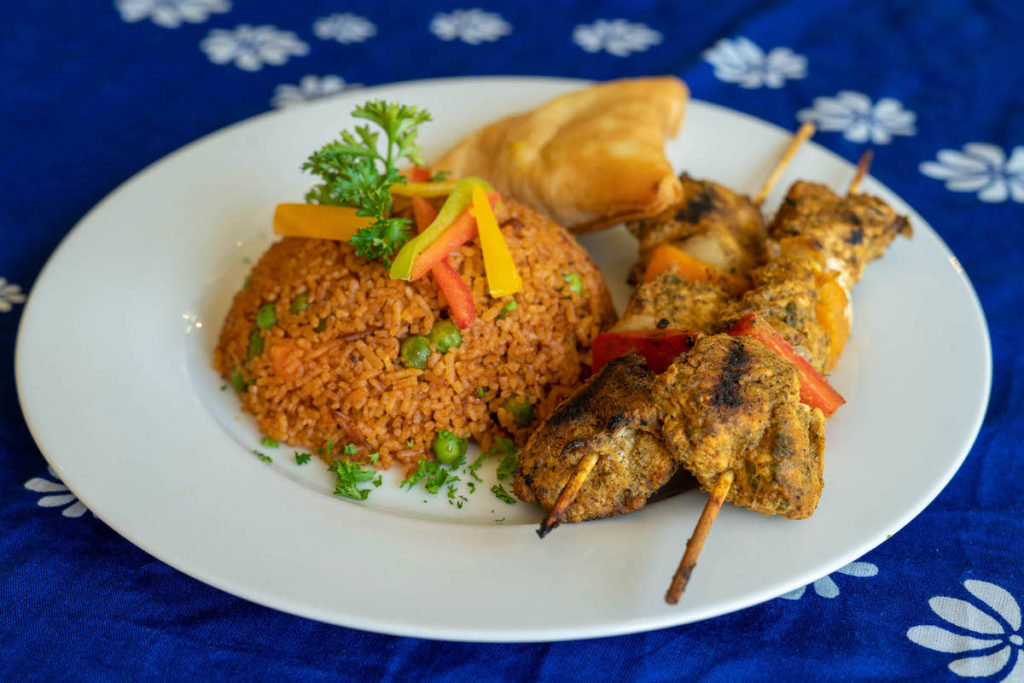
And then we have the yassa, which includes grilled chicken with an onion sauce. We’re going to be introducing this peanut butter stew too, called mafé. We tried it once at [FIN’s Taste Around the Globe booth at] Pike Place, and people loved the taste. It’s one of the most nutritious dishes, made of peanut butter with a base of slow-cooked onion and tomatoes. You can eat it like a soup, but we also serve it with rice. We make it with beef, chicken, or veggies.
We have lots of dishes, so we’re going to be alternating our menu! We have a whole lot in mind that we want to add to Spice Bridge.
Can you tell me what challenges you've encountered in starting your business?
The challenges we’ve encountered are marketing, and cooking space. Now, thankfully, we are getting FIN’s help with marketing and we are looking forward to having our own cooking space at Spice Bridge. Our hopes are really high!
So Afella Jollof Catering will have a home at Spice Bridge—that’ll be great! What is your dream for your business?
The dream for our business is for us to be well recognized, and we’re off to a good start. At Pike Place, we have people who traveled and referred people to come back. We want to show people what we can do, become well-known, and we want to grow from Spice Bridge. I know it’s going to be a long-running thing!

Can you tell me more about your plans for the spices you're making?
Right now we sell them in our own community, but our hopes are to package them and sell them online, in stores, and everywhere!
I’m very impressed by what Lilian Ryland is doing. Packaging food has been on my mind, and when I saw what she’s doing, I was like, “Yes, this is what we wanted!” [Editor’s note: Lilian Ryland has grown her business, Naija Buka, while participating in our Food Business Incubator. Lilian started with catering and pop-ups, and now has a packaged product line that is available at PCC stores and online. Her success is an inspiration to Adama and other entrepreneurs, and Lilian is also a great mentor.]
Tell me a little more about you and Oumie.
We were raised learning how to cook. Our mom taught us how to cook, and then we had a passion for it. We like organizing events, hosting, cooking good food, and presenting it. We love inviting people to come over.

We’ve been known for being exceptional cooks in our community, and they started telling us that we need to do something bigger. One of our nieces hooked us up with [FIN Cultural Outreach Specialist] Njambi Gishuru, who believed we would make a good catering outfit. Njambi encouraged us to go outside our community and let people try what we make.
The most exciting thing was when we were invited for a food tasting event at the Port of Seattle, they were very impressed by our food. I’ve been in the U.S. for 16 years, and Seattle has been the best part. This is where I was able to bring my cooking skills and people know what we are capable of doing. Here we are with FIN and it is very exciting!
Visit Spice Bridge
Starting in September, you’re invited to stop by Spice Bridge to order Afella Jollof Catering and other wonderful cuisines for takeout or outdoor dining. (We’re also working on delivery options—stay tuned.) Afella Jollof Catering will be open on Tuesdays, Wednesdays, and Thursdays from 11 a.m. to 8 p.m. They're also available for events, with service ranging from all-inclusive to drop-off.
Contact Afella Jollof Catering
- Website: afellajollof.square.site
- Email: afellajollofcatering@gmail.com
- Phone: (425) 465-6600 or (425) 399-4628
- Facebook: @afellajollof
- Instagram: @afellajollof

Thanks to FIN volunteer Lily Rybarczyk for assistance writing this Q&A!
Spice Bridge opens in just a couple of weeks!
Exciting news: We'll open the doors to Spice Bridge on Sept. 8! You're invited to come by for takeout and outdoor dining. Delivery options are in the works—stay tuned.
During our first month, four food businesses will offer delicious foods and beverages:
- Moyo Kitchen will serve Somali-Kenyan-Tanzanian fusion food inspired by Zanzibar, the world’s spice capital.
- Afella Jollof Catering will cook up Gambian/Senegalese cuisine.
- Seatango will craft artisan savory and sweet pastries from Argentina.
- Taste of Congo will offer authentic Congolese cuisine.
In October, four more businesses will join the rotation:
- Wengay’s Kitchen will be the area’s go-to source for authentic Filipino food.
- Jazze's will offer Afghani food made from organic, locally-grown ingredients.
- Theary Cambodian Foods will serve authentic Cambodian/Khmer cuisine.
- WUHA will offer "fast" Eritrean/Ethiopian food options, serving both authentic foods and American foods cooked with Eritrean spices as a gateway to more traditional dishes.
We'll introduce you to the businesses one by one starting this week. Sign up for our email updates and follow Spice Bridge on Facebook and Instagram for the latest news!
Join our Kitchen Club
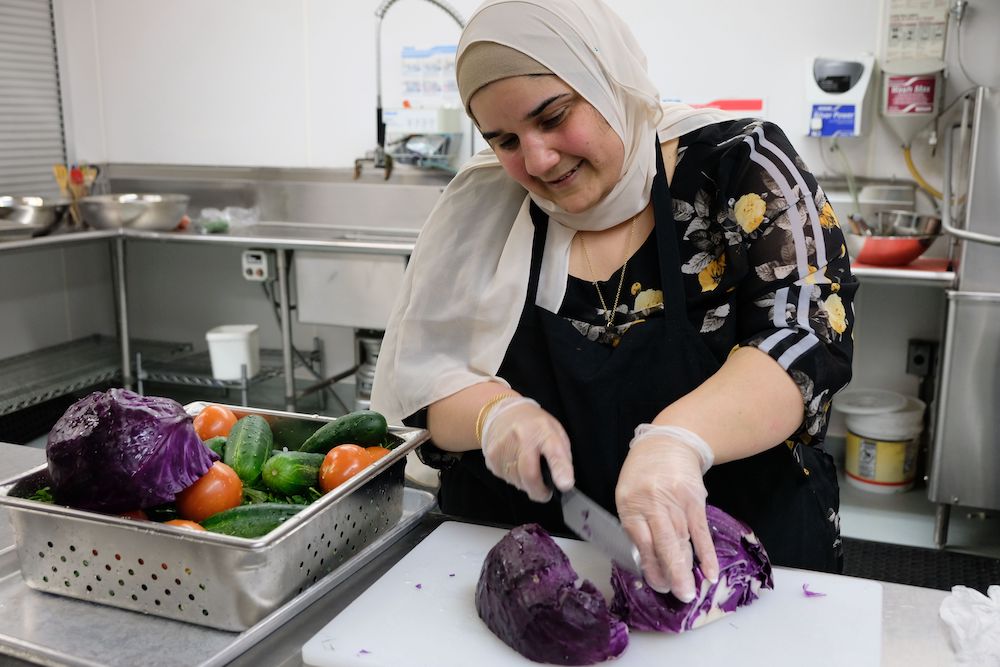
Eater Seattle just published a guide on how to help stop hunger and support local food businesses in our community. We're honored that FIN was included as an organization to support!
Here's a fun opportunity for you to get involved and support the food businesses that will call Spice Bridge home: Join our Kitchen Club to help us equip the facility with essentials like pots and pans. You can become part of the club—and have your name listed as a founding member!—one of three ways:
- Contribute $25 or more at our online fundraising page.
- Donate in-kind commercial grade kitchen equipment. See our wish list.
- Purchase items directly through our Webstaurant wish list, and they will be mailed to us.
Join our Spice Bridge Kitchen Club!
The kitchen at Spice Bridge will open soon, and we need your help to equip it with essentials like prep tables, pots, and pans. Please join our Kitchen Club to help us raise $15,000. You can become part of the club—and have your name listed as a founding member!—one of three ways:
1. Donate $25 or more at our online fundraising page. An amazing supporter has committed to match cash contributions up to $2,500—don't miss this opportunity to double your impact!
2. Donate in-kind commercial grade kitchen equipment. See our wish list.
3. Purchase items directly through our Webstaurant wish list, and they will be mailed to us.
Meet Faizah, the newest member of FIN’s team!
We're delighted to introduce you to Faizah Shukru, who recently joined our team to coordinate Tukwila Village Farmers Market and other FIN events! Faizah has lived in Tukwila for more than a decade, and brings experience serving community both as a volunteer and as a professional social worker.
Read our interview to learn more about Faizah, and then meet her in person at Tukwila Village Farmers Market!
How did you learn about Food Innovation Network, and what drew you to join our team?
I learned about FIN through the job opportunity that was posted online. I am familiar with Global to Local, and my parents had participated in programs years ago when I was in middle school so I know that they did great work. What drew me to the team was the passion for food justice in the communities being served and the emphasis on utilizing the community to fight for food justice. Giving the community opportunities to grow and sell their own produce is amazing and shows the importance of community collaboration and partnerships.
You're going to coordinate Tukwila Village Farmers Market! What's your favorite vegetable, and how do you like to prepare it?
My favorite vegetable is asparagus! I love to do a simple salt/black pepper seasoning or even a garlic salt seasoning and a little bit of lemon juice. It can be baked or pan-cooked and served with rice and salmon or chicken and a salad. Delicious. :)
What do you love about living in Tukwila? If you could change anything about Tukwila, what would it be?
What I love most about Tukwila is the richness in diversity. Tukwila is the first place that I felt like I was “at home.” There is so much culture and diversity around you and gives you the opportunity to learn about other peoples’ culture.
If I could change one thing about Tukwila I would stop the rapid gentrification happening. Tukwila is known for the many culturally diverse small businesses and that is slowly being taken away from us one by one.
FIN's office is closed June 12 in recognition and support of Black Lives Matter Seattle-King County’s call for a statewide march and general strike. How do you plan to spend the day?
I was excited to see that the FIN office would be closed this in support of the march and general strike. I think it is important to take a stance and show support and solidarity with the movement, especially when the community around us are largely people of color and immigrants.
I plan on supporting the movement in any way that I can, and will most likely be attending a protest hosted by local youth. As a Black Muslim woman myself I have been working on fighting for what I believe is right while also taking care of my own mental and emotional wellness, and will continue to do so on the 12th and beyond.
Is there anything else you'd like the FIN community to know about you?
I am extremely excited to be joining the FIN team. I have a passion for community work and believe that a holistic approach to community is important. Many of our communities face various struggles including housing instability and food inequities, and I am excited to be able to join a team that values the importance of addressing food disparities and utilizing community members as part of the solution to closing those disparities.
FIN entrepreneurs make meals for communities affected by COVID-19
FIN entrepreneurs are contributing their time and skills to make tasty, healthy meals for families and older adults who need them. Check out our photo album, and watch a video featuring our first meal's lead chef, Naija Buka owner Lilian Ryland:
We're now cooking up 600 hot meals each week. Our partner Linda Croasdill at the City of SeaTac Senior Program reports, "The meals have been a big hit and everyone would like to give you and your support team a great big air hug and a really big smile."
We are excited to share that we are collaborating with the American Heart Association to provide hot meals and support our Food Business Incubator entrepreneurs in the process. American Heart Association’s support has allowed us to expand our meals and add health education components to the work. This summer we will work together to support seniors living with food insecurity and establish deeper connections for the community.
Huge thanks to everyone who’s helping to nourish our community as we face this challenge together. We're grateful to our individual donors, who have collectively contributed more than $2,500. We're also thankful for:
Our in-kind supporters
- Tilth Alliance is providing fresh, locally grown produce weekly
- Macrina Bakery is supplying wonderful baked goods weekly
- Project Feast is donating key ingredients, cooking dishes, and sharing much-needed kitchen facilities
- Des Moines Area Food Bank is supplying dried beans and other legumes
- Food Lifeline is contributing staple food ingredients weekly
- The Storehouse Covington Food Bank has contributed ingredients
- FIN entrepreneurs, Incubator program manager Kerrie Carbary, and many of Kerrie's neighbors have contributed ingredients
- Cheri Mayer gave our kitchen and delivery crews homemade masks to support health and safety
Our chefs, meal packers, and delivery drivers
- FIN entrepreneurs including Naija Buka owner Lilian Ryland, Mamá Tila owner Ofelia Anorve, Monique's Hot Kitchen owner Monica Wachira, Seatango owners Monica di Bartolomeo and Ariel Firpo, and Soozveen Mediterranean Catering owner Sheelan Shamdeen
- Community volunteers including Liyu Yirdaw, Theary Ngeth, Khadija Yusuph, Mwana Moyo, Batulo Nuh, and FIN Steering Committee Co-chair Ehler Win
- Global to Local staff members including Abdi Hussein, Jonathan Sugarman, Katie Behrends, Deeqa Mah, Roda Sugulle, Kara Martin, Kerrie Carbary, and Denise Miller
Our community partners distributing meals
- Somali Youth & Family Club
- Congolese Integration Network
- Somali Health Board
- City of SeaTac Senior Program
- Catholic Community Services
- Living Well Kent
Get involved
You can make a donation at bit.ly/FINmeals, or email Kerrie if you’d like to help in another way: kerrie@foodinnovationnetwork.org
